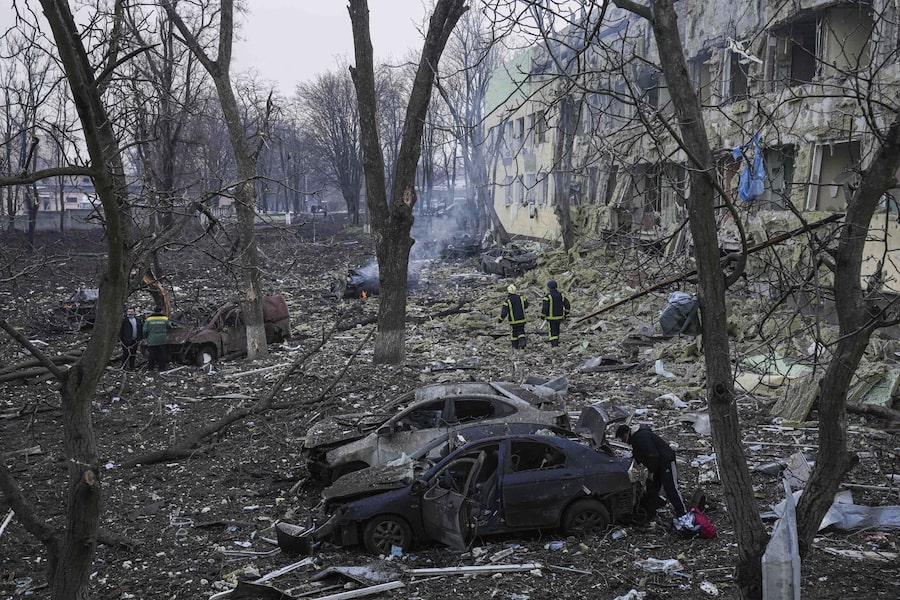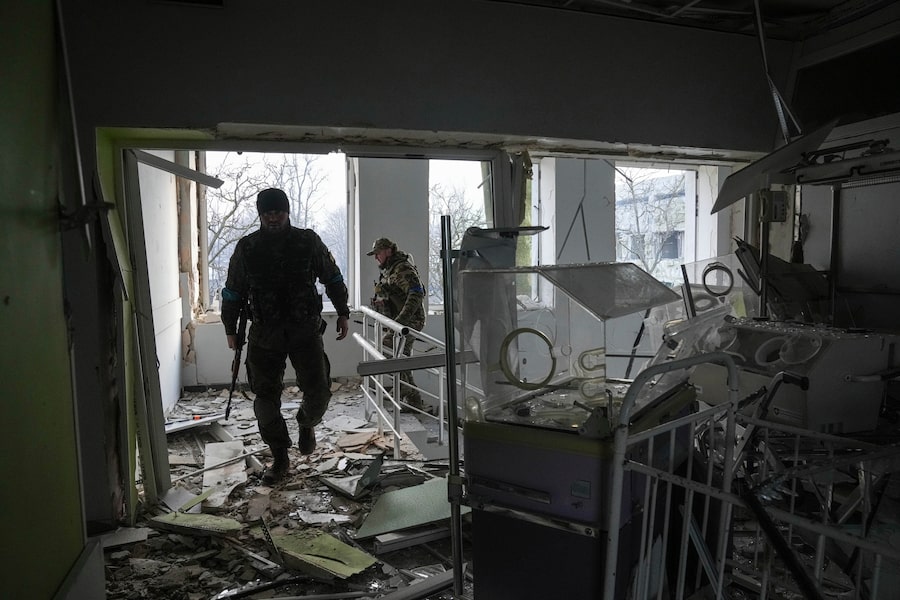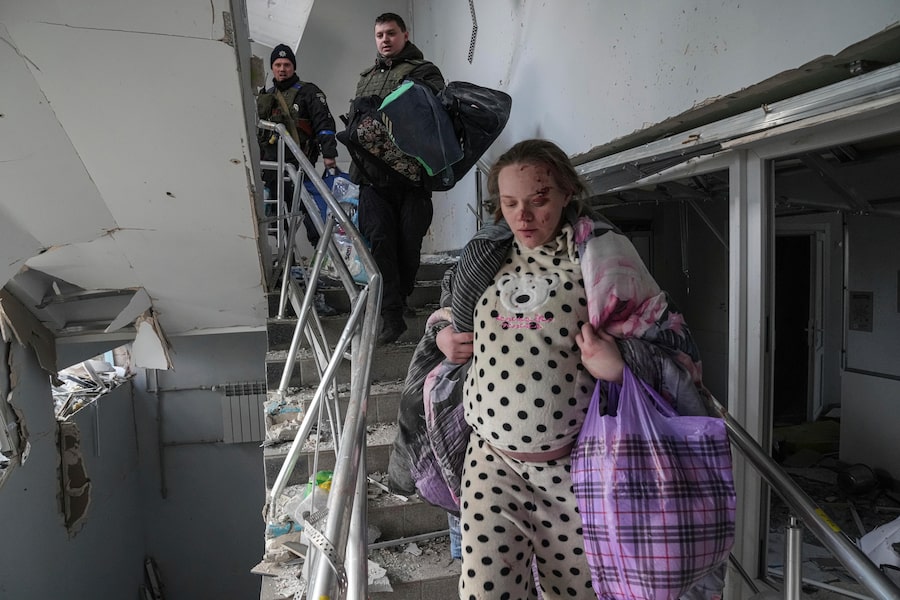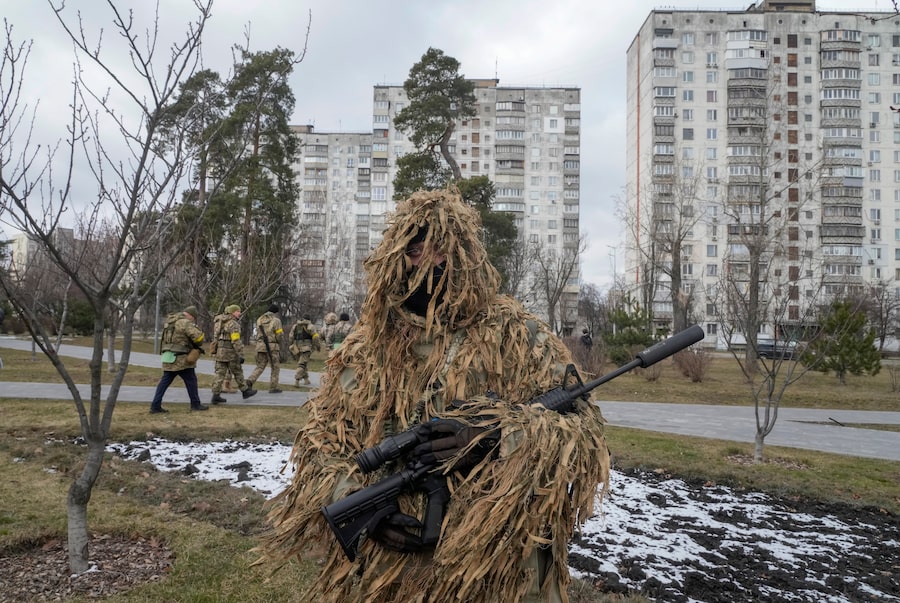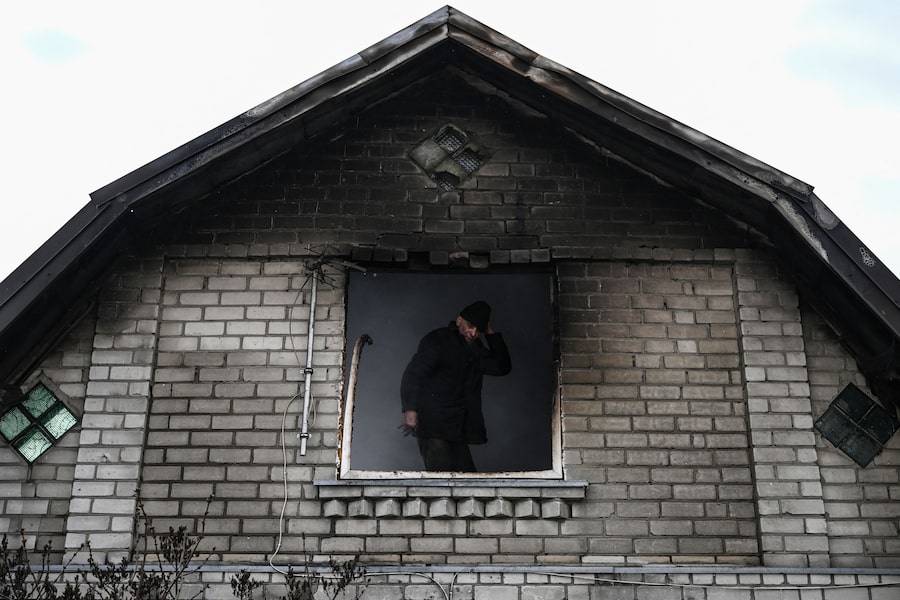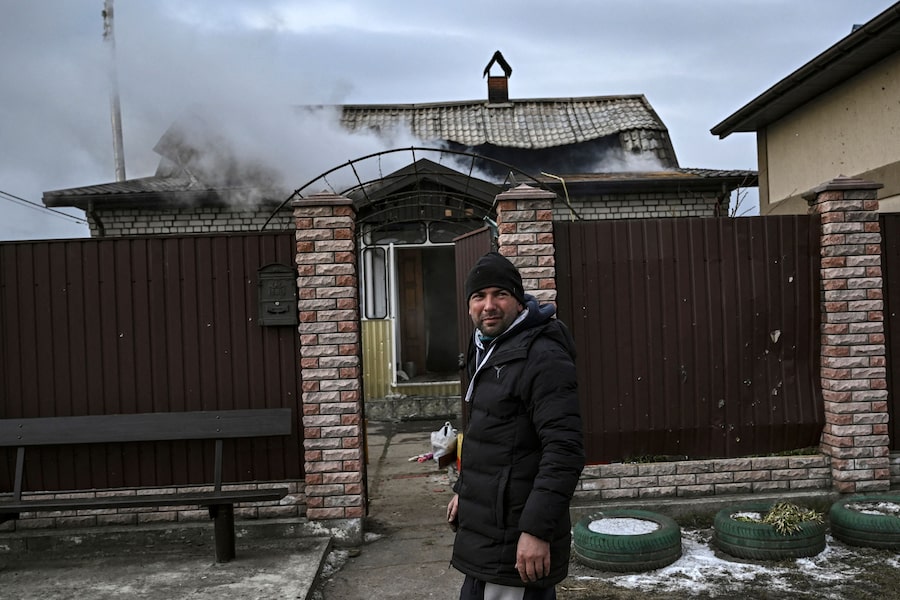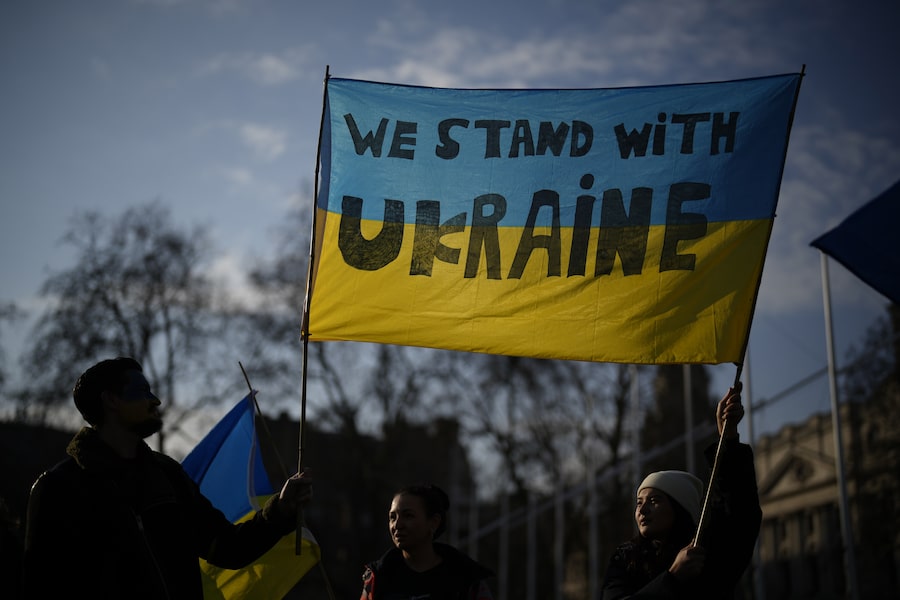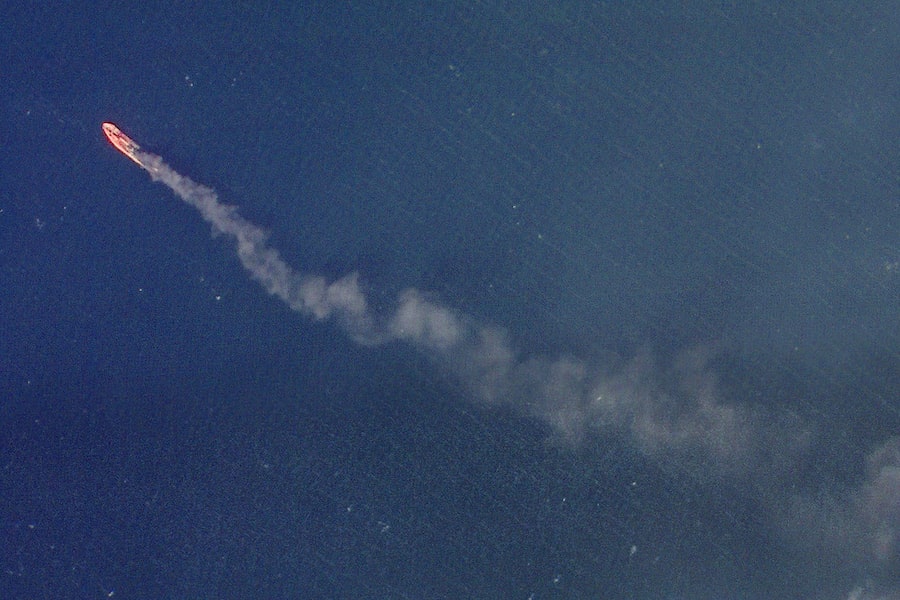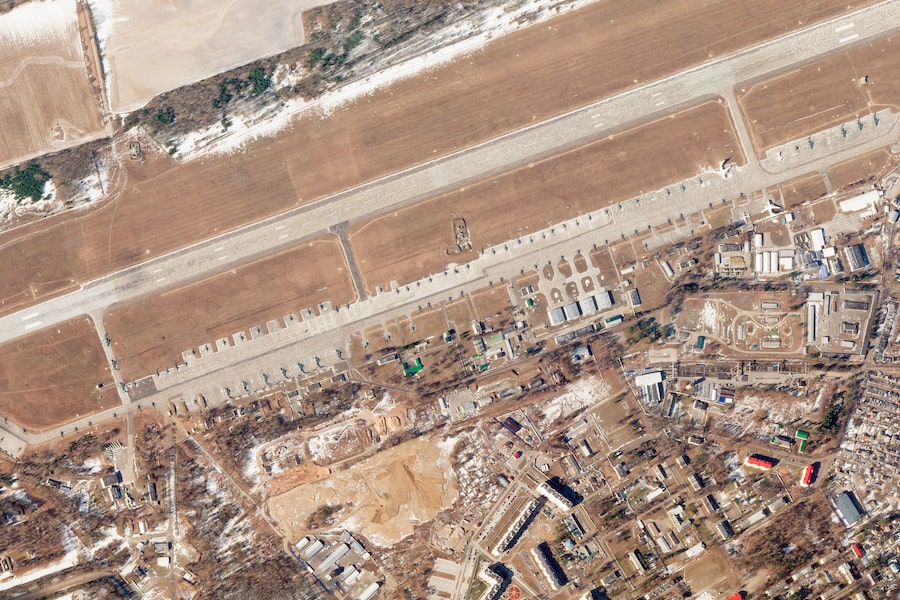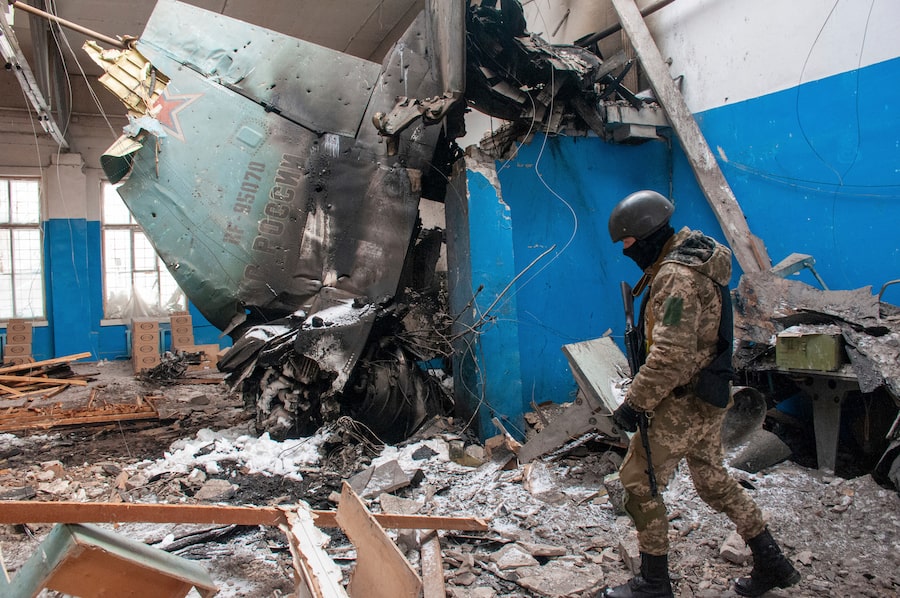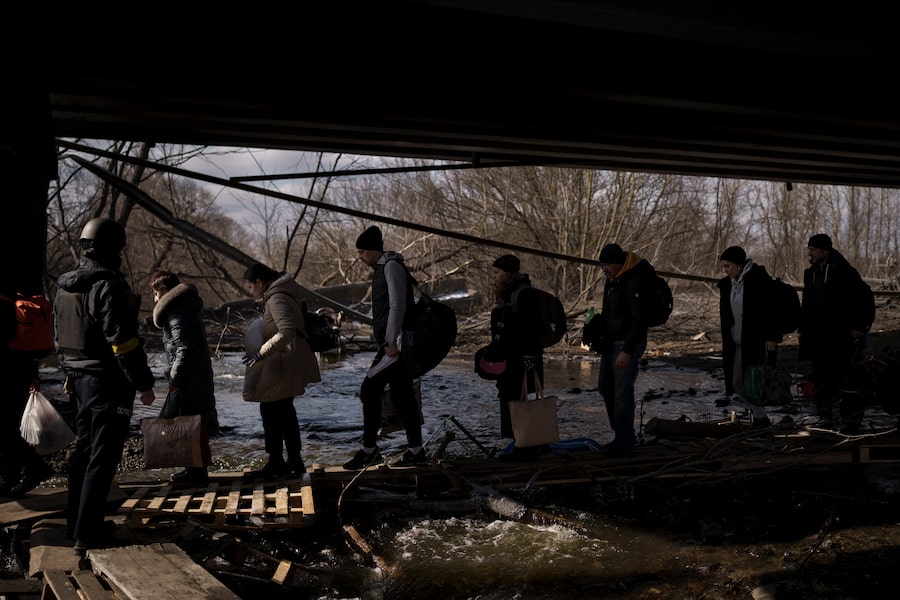This digest has now been archived. Find the latest Russia-Ukraine updates here.
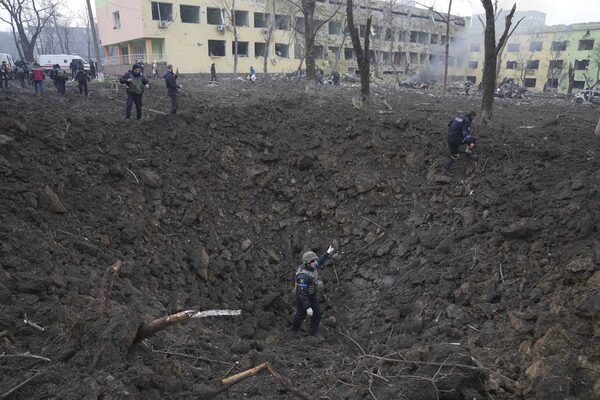
Ukrainian soldiers and emergency employees stand in a crater left by a Russian airstrike that damaged a maternity hospital in Mariupol, Ukraine, Wednesday, March 9, 2022, injuring 17 people.Evgeniy Maloletka/The Associated Press
Here are the latest updates on the war in Ukraine:
- The Biden administration publicly warned Wednesday that Russia might seek to use chemical or biological weapons in Ukraine as the White House rejected Russian claims of illegal chemical weapons development in the country it has invaded.
- Ukrainian officials said a Russian air strike has left children “under wreckage” at a maternity hospital in Mariupol on Wednesday. City authorities say they’re burying their dead in a mass grave as Russia’s bombardment continues.
- Prime Minister Justin Trudeau spoke with Ukrainian President Volodymyr Zelensky and promised to send more military equipment.
- The UN’s refugee agency now estimates 2.1-2.2 million people have fled Ukraine. Hundreds of Russians are also fleeing their country as heavy sanctions bring economic uncertainty and fears of conscription and marital law leave many feeling unsafe.
- Earlier, a Ukraine adviser warned the International Atomic Energy Agency has lost contact with the monitoring systems at the Chernobyl nuclear plant in what is being called “an extremely dangerous situation.”
10:30 p.m. ET
U.S. House approves $13.6-billion aid package for Ukraine
The U.S. House approved a massive spending bill Wednesday night that would rush $13.6-billion in aid to battered Ukraine and its European allies.
The Ukraine aid included $6.5-billion for the U.S. costs of sending troops and weapons to Eastern Europe and equipping allied forces there in response to Russian President Vladimir Putin’s invasion and repeated, bellicose threats. There was another $6.8-billion to care for refugees and provide economic aid to allies, and more to help federal agencies enforce economic sanctions against Russia and protect against cyber threats at home.
In a rare sign of unity on Capitol Hill, both Democrats and Republicans overwhelmingly supported the aid package for Ukraine. Enmity toward Putin and a desire to send assistance to the region is virtually universal in Congress.
-The Associated Press
9:27 p.m. ET
Ukrainian-Canadian musicians finding respite from grief and rage on stage
Ukrainian-Canadian musicians are among those struggling at this devastating time: watching the news from home, terrified for family and friends, and then going on stage to play nonetheless – an almost surreal respite from the grief and rage.
For Marichka and Mark Marczyk, who form Balaklava Blues, aToronto-based band that performs wildly contemporary renditions of Ukrainian folk songs, it is particularly personal.
Ms. Marczyk has barely slept through this time, she says, trying to help people back home find refuge or shelter. Her sister and family made it to Istanbul; her mother has been in Toronto since January. “I always think, oh my God, thanks God my mom is not in Kyiv.” Many of her friends – musicians, artists – are fighting.
9:15 p.m. ET
700 civilians evacuated from Kyiv outskirts
Hundreds of Ukrainians living in towns occupied by Russian troops on the outskirts of Kyiv fled Wednesday.
Streams of cars — some fixed with white flags — filed down the road, joined by lines of yellow buses marked with red crosses.
The Interior Ministry said about 700 people were evacuated from Vorzel and Irpin. People from three other Kyiv suburbs were unable to leave. Some who managed to get out said they hadn’t eaten in days.
“I forgot when I ate last,” said an Irpin resident who gave only her first name, Olena. “I’m so scared. I need to keep walking.”
Iuliia Bushinska, a Vorzel resident, said: “Occupiers came to our house and they were ready to shoot us.”
“They took away our house, our car, they took away our documents. So we need to start our life from the beginning. We survived things that I never experienced in my life,” Bushinska said.
-The Associated Press
7:36 p.m. ET
EU leaders to tackle ways to divest from Russian fossil fuels at summit in Versailles
A display shows fuel prices in Swiss francs per liter and natural gas price per kilo at a BP gas station near Pratteln, Switzerland, March 9, 2022.ARND WIEGMANN/Reuters
European Union leaders will tackle ways to wean themselves off Russian fossil fuels on Thursday and debate how quickly to ditch their key supplier, with countries split over whether to sanction oil and gas imports as Moscow wages war in Ukraine.
Russia’s invasion of Ukraine prompted Brussels to unveil plans this week to reduce reliance on Europe’s top gas supplier this year and end it within the decade.
How to implement those plans, not to mention how to finance them, will be a key topic under discussion at a two-day summit in Versailles, France.
A draft of the summit statement, seen by Reuters, would agree to phase out the EU’s dependency on imports of Russian gas, oil and coal, including by ramping up liquefied natural gas imports and speeding up deployment of renewable energy. It did not set a date for the phase-out.
“Some are asking 2030, some are asking 2027, some are saying now,” an EU official said, referring to the member states.
The 27 countries of the EU rely on Russia for 40 per cent of their collective gas needs, 27 per cent of oil imports and 46 per cent of coal imports.
-Reuters
7:15 p.m. ET
White House warns Russia may use chemical weapons in Ukraine
A fighter with Ukraine's Territorial Defense Force during a training session with a rocket-propelled grenade, or RPG, in Kyiv on March 9, 2022.LYNSEY ADDARIO/The New York Times News Service
The Biden administration publicly warned Wednesday that Russia might seek to use chemical or biological weapons in Ukraine as the White House rejected Russian claims of illegal chemical weapons development in the country it has invaded.
Russian Foreign Ministry spokeswoman Maria Zakharova this week, without evidence, accused Ukraine of running chemical and biological weapons labs in its territory, supported by the U.S. White House press secretary Jen Psaki called Russia’s claim “preposterous” and said it could be part of an attempt by Russia to lay the groundwork for itself using such weapons of mass destruction against Ukraine.
“This is all an obvious ploy by Russia to try to justify its further premeditated, unprovoked, and unjustified attack on Ukraine,” Psaki tweeted Wednesday. “Now that Russia has made these false claims, and China has seemingly endorsed this propaganda, we should all be on the lookout for Russia to possibly use chemical or biological weapons in Ukraine, or to create a false flag operation using them.”
The U.S. for months has warned about Russian “false flag” operations to create a pretext for the invasion. Wednesday’s warning suggested Russia might seek to create a pretense for escalating the two-week old conflict that has seen the Russian offensive slowed by stronger-than-expected Ukrainian defenders, but not stopped.
Pentagon press secretary John Kirby on Wednesday called the Russian claim “a bunch of malarkey.”
The international community for years has assessed that Russia has used chemical weapons before in carrying out assassination attempts against Putin enemies like Alexey Navalny and former spy Sergei Skripal. Russia also supports the Assad government in Syria, which has used chemical weapons against its people in a decade-long civil war.
Asked by a Russian journalist about the claims, United Nations spokesman Stephane Dujarric said. “At this point have no information to confirm these reports or these allegations about these kinds of labs.”
-The Associated Press
7:00 p.m. ET
Russia’s economy is in chaos. These charts show how the crisis will get worse
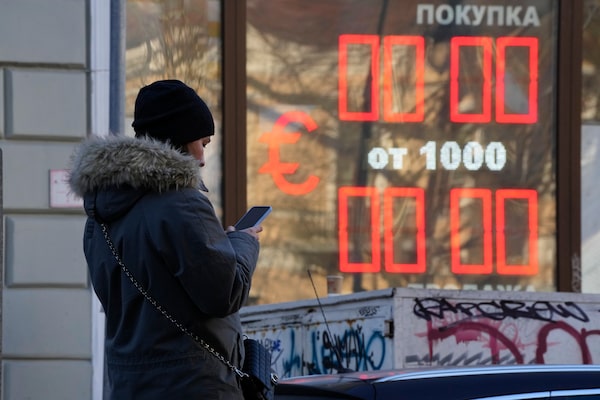
A woman walks past a currency exchange office that stopped exchange operations with the Euro in St. Petersburg, Russia, March 9, 2022.The Associated Press
As Russian President Vladimir Putin’s invasion of Ukraine approaches its third deadly week, a financial counteroffensive unleashed by Western governments across multiple fronts has already sunk his country’s economy into a crisis that it may not recover from for years, if ever.
Evidence of Russia’s economic implosion mounts by the day. On Tuesday Fitch Ratings downgraded Russia’s credit rating to junk status and said a default on Russia’s foreign debt obligations is “imminent.”
The rating change came after U.S. President Joe Biden imposed a ban on imports of Russian oil and gas, a move he said targeted “the main artery of Russia’s economy,” which relies heavily on energy exports to fill its coffers.
Meanwhile, more Western companies pulled out of Russia, part of a widening corporate boycott against the invasion. McDonald’s Corp., Coca-Cola Co. and Starbucks Corp. closed their Russian locations Tuesday. A day later, Canadian e-commerce company Shopify Inc. suspended operations in Russia and Belarus.
All told, more than 300 companies had pulled out of Russia as of Wednesday, according to a running list compiled by Yale School of Management professor Jeffrey Sonnenfeld.
The sanctions imposed on the Russian government, officials, individuals, companies and the country’s central bank have been swift and unprecedented. “While there’s robust debate about whether these sanctions will achieve their political goals and convince Mr. Putin to change his behaviour, their economic impact is far more clear cut,” Neil Shearing, chief economist at Capital Economics, wrote in a note this week.
-The Globe and Mail’s Jason Kirby
6:27 p.m. ET
Zelensky calls on West to impose even tougher sanctions on Russia after air strike on Mariupol hospital

A handout photograph released by the UK Parliament shows Ukraine's President Volodymyr Zelensky speaking to Britain's MPs by live video-link in the House of Commons, in London, on March 8, 2022.JESSICA TAYLOR/AFP/Getty Images
Ukrainian President Volodymyr Zelensky called on the West to impose even tougher sanctions on Russia after the airstrike on the maternity hospital in Mariupol.
“A genocide of Ukrainians is taking place,” Zelensky said Wednesday in his daily late evening video address to the nation. Wearing his now traditional wartime army green, he said the West should strengthen the sanctions so Russia “no longer has any possibility to continue this genocide.”
He said 17 people were injured in the attack, including pregnant women.
Mariupol has been blockaded by Russian troops for nine days. City officials said Wednesday that about 1,200 residents have been killed.
Zelensky again called on Western leaders to impose a no-fly zone over Ukraine, something NATO members have refused to do for fear of provoking a wider war with Russia. Short of that, Zelensky called for the delivery of more fighter jets to Ukraine, a proposal the Pentagon rejected on Wednesday.
Zelensky said about 35,000 civilians have used humanitarian corridors to flee to western Ukraine to escape the fighting.
-The Associated Press
6:12 p.m. ET
Twitter launches privacy-protected version, bypassing Russia’s block
The Twitter logo is seen at the company's headquarters in San Francisco, California Oct. 4, 2013.Robert Galbraith/Reuters
Twitter has launched a privacy-protected version of its site to bypass surveillance and censorship after Russia restricted access to its service in the country.
Russia has blocked access to Facebook and has limited Twitter in an attempt to try to restrict the flow of information about its war in Ukraine. Both companies have said they are working on restoring access to people inside Russia even as they restrict the country’s state media from their services.
Known as an “onion” service, users can access this version of Twitter if they download the Tor browser, which allows people to access sites on what is also referred to as the “dark web.” Instead of .com, onion sites have a .onion suffix.
While the term “dark web” connotes illegal sites such as the now-defunct Silk Road drug market, it is also often used by people seeking to remain anonymous for their safety and also to access sites censored by repressive governments.
Facebook and other sites such as the BBC also have versions accessible on Tor.
-The Associated Press
5:40 p.m. ET
U.S. slams door on providing Ukraine with MiG fighter jets
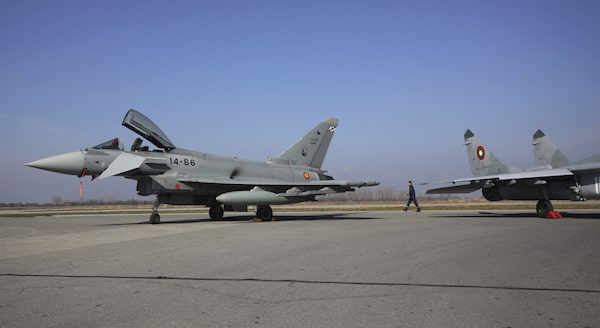
A military officer is passing between Bulgaria's MiG-29 and Spanish Eurofighter EF-2000 Typhoon II aircraft and MiG-29, in Graf Ignatievo, Feb. 17, 2022.Valentina Petrova/The Associated Press
The Pentagon slammed the door Wednesday on any plans to provide MiG fighter jets to Ukraine, even through a second country, calling it a “high-risk” venture that would not significantly change the Ukrainian Air Force’s effectiveness.
Pentagon press secretary John Kirby told reporters that Defense Secretary Lloyd Austin spoke with his Polish counterpart on Wednesday and told him the U.S. assessment. He said the U.S. is pursuing other options that would provide more critical military needs to Ukraine such as air defense and anti-armor weapons systems.
Poland had said it was prepared to hand over MiG-29 planes to NATO that could then be delivered to Ukraine, but Kirby said U.S. intelligence concluded that it could trigger a “significant” Russian reaction.
-The Associated Press
5:22 p.m. ET
Russian strike hits children’s hospital in Mariupol, Ukraine
5:15 p.m. ET
Kyiv governor calls fight for city ‘Judgement Day’
4:35 p.m. ET
Russian ruble drops to record lows in Moscow amid fresh sanctions
Russia’s ruble tumbled to record lows in onshore trading on Wednesday despite measures by Moscow to shore up its battered economy and safeguard hard currency availability amid fresh economic sanctions triggered by its invasion of Ukraine.
Catching up after two days of market closure, the ruble jumped to 120.83 to the dollar on the Moscow Exchange before clawing back some losses to close at 120, or 12.5% softer than its Friday close.
It closed 6.3% weaker against the euro at 127 after hitting a record 131 per euro in early trade. Russia’s financial markets have been thrown into turmoil since its invasion of Ukraine prompted severe economic sanctions.
-Reuters
3:50 p.m. ET
Ukraine can’t negotiate with ‘gun to head,’ says Joly as Trudeau presses allies
Canadian Foreign Minister Melanie Joly speaks ahead of the European Union foreign ministers meeting, amid Russia's invasion of Ukraine, in Brussels, Belgium March 4, 2022.YVES HERMAN/Reuters
Canada’s foreign affairs minister called for a ceasefire in Russia’s invasion of Ukraine on Wednesday, arguing the Ukrainian government needs the breathing room as it heads into talks with the Putin regime.
“We need to make sure to support Ukrainians while diplomatic talks are happening by imposing maximum pressure … it’s more than that. Because when we do so, we actually give them a lever to negotiate,” Foreign Affairs Minister Mélanie Joly said in an interview Wednesday.
“Right now, it’s not about a diplomatic solution. It’s about saving lives and so that’s why it’s a humanitarian corridor … and there needs to be a ceasefire,” she added.
“Because you can’t negotiate when you have a gun to your head.”
-The Canadian Press
3:32 p.m. ET
Mariupol buries dead in mass grave
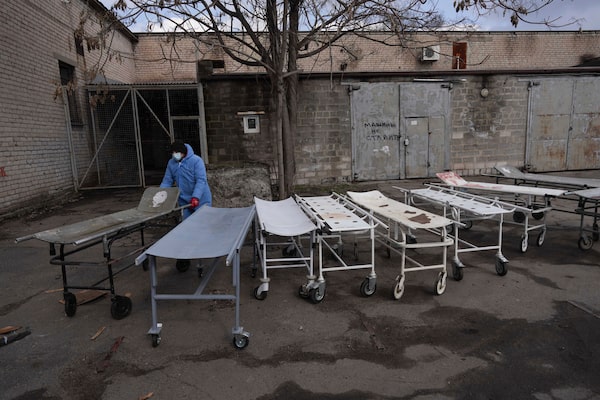
A mortuary worker wheels a stretcher used to move dead bodies before they are buried in a mass grave on the outskirts of Mariupol, Ukraine, March 9, 2022.Evgeniy Maloletka/The Associated Press
Under steady Russian bombardment, workers in Ukraine’s besieged southern port city of Mariupol are hastily and unceremoniously burying scores of dead Ukrainian civilians and soldiers in a mass grave.
With morgues overflowing and more corpses uncollected in homes, city officials decided they could not wait to hold individual burials.
A deep trench about 25 metres long dug in an old cemetery in the heart of the city is filling up with bodies collected by municipal social service workers from morgues and private homes.
Some are brought wrapped in carpets or plastic bags. Forty came Tuesday, another 30 so far Wednesday. They include civilian victims of shelling on the city and soldiers, as well as civilians who died of disease or natural causes.
Other city workers are also bringing bodies so the numbers being buried are quickly rising and the total in the long grave is now unclear. Workers quickly make the sign of the cross after pushing the bodies into the common grave. No family members or other mourners are present to say their goodbyes.
The work is carried out efficiently, and unceremoniously, as a result of the ever-present danger. Shells landed in the cemetery itself Tuesday, interrupting the burials and damaging a wall. The city plans to close this grave Thursday, if the bombardments stop long enough to allow workers to do so.
-The Associated Press
3:20 p.m. ET
NATO to decide by June if buildup in eastern Europe becomes permanent

NATO Secretary General Jens Stoltenberg, right, Canadian Prime Minister Justin Trudeau, centre, and Canadian Minister of National Defence Anita Anand talk to each other during their visit to Adazi Military base in Kadaga, Latvia, March. 8, 2022.ROMAN KOKSAROV/The Associated Press
NATO Secretary General Jens Stoltenberg says leaders of the military alliance will make a decision by June on transforming its massive defence buildup in the Baltics and Eastern Europe into a more permanent presence and boosting its ability for rapid response to crises.
Mr. Stoltenberg, the top civilian at the 30-member North Atlantic Treaty Organization, told an Ottawa defence conference that Russia’s military assault on Ukraine will require longer-term changes at the 72-year-old alliance.
Several years ago, NATO member countries deployed about 5,000 troops plus equipment on NATO’s eastern flank after Moscow’s annexation of Crimea and in recent months this force strength has been doubled in the face of Russia’s menacing of Ukraine.
The secretary general was asked Wednesday at the Ottawa Conference on Security and Defence whether NATO would have to move to a permanent defence of its eastern flank, which includes the Baltic States, Poland, as well as Slovakia, Hungary, Bulgaria and Romania. He said decisions will be made this summer.
-The Globe and Mail’s Steven Chase and Robert Fife
3:00 p.m. ET
Hundreds of Russians flee their country for Finland amid sanctions’ heavy economic toll

People arrive with the Allegro train from St Petersburg, Russia to the central railway station in Helsinki, Finland, on March 6, 2022.EMMI KORHONEN/AFP/Getty Images
The 350-seat Allegro train from St. Petersburg was close to capacity as it pulled into Platform 9 of Helsinki’s main train station a few minutes late Wednesday morning. With Finnish airspace now closed to Russian planes, the train – which has ferried passengers 390 kilometres between the two cities for work or pleasure since 2010 – is one of the few remaining routes out of Russia for anyone who can’t drive or walk.
International sanctions against Moscow in retaliation for its invasion of Ukraine have inflicted a heavy economic toll on the country. Energy markets have been plunged into a frenzy as Western countries pivot away from Russian oil and gas, and the Kremlin has accused the United States of declaring an economic war on Russia. Moscow has denied reports that it intends to impose martial law, but broad economic uncertainty and fear of conscription have left some Russians worried about the war and its implications.
Now, the Allegro train’s twice-daily trips to Finland are carrying hundreds of them west.
Natalya, a 22-year-old graphic artist from Moscow, got off the train Wednesday morning wrapped against the cold in a maroon and yellow-striped Gryffindor scarf. She didn’t want to give her last name for fear of government reprisals but told The Globe and Mail she planned to stay in Finland for a few days before moving on to other European countries. Ultimately, she hopes to secure a visa to the United States.
-The Globe and Mail’s Emma Graney
2:50 p.m. ET
Canada can help Europe turn to renewables instead of Russian oil, environment minister says

Steven Guilbeault, Minister of Environment and Climate Change for Canada speaks during a press conference at the COP26 UN Climate Summit in Glasgow, Scotland, Nov. 12, 2021.Alastair Grant/The Associated Press
Environment Minister Steven Guilbeault says Canada cannot realistically help Europe replace its Russian oil imports with Canadian crude or natural gas, but it can and is looking at ways to export renewable energy like hydrogen.
Europe relies on Russia for about one-third of its oil supplies and more than 40 per cent of its natural gas.
The Russian invasion of Ukraine is pushing the continent to cut off that dependency as soon as possible but finding alternative sources is not simple.
Guilbeault says the infrastructure is not there for Canada to get oil and gas to Europe easily and even if it could, European refineries aren’t set up to process the heavy crude Canada produces.
But he says there are ways Canada can work with Europe quickly on exports of clean and renewable energy like hydrogen, which the continent was already starting to move toward.
-The Canadian Press
2:18 p.m. ET
At least 17 wounded after air strike hits Ukraine maternity hospital
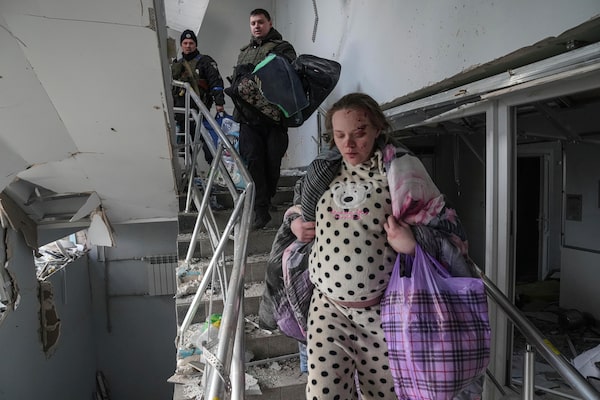
An injured pregnant woman walks downstairs in the damaged by shelling maternity hospital in Mariupol, Ukraine, March 9, 2022.Evgeniy Maloletka/The Associated Press
A Russian air strike devastated a maternity hospital Wednesday in the besieged port city of Mariupol and wounded at least 17 people, Ukrainian officials said, amid growing warnings from the West that Moscow’s invasion is about to take a more brutal and indiscriminate turn.
The ground shook more than a mile away when the Mariupol complex was hit by a series of blasts that blew out windows and ripped away much of the front of one building. Police and soldiers rushed to scene to evacuate victims, carrying out a heavily pregnant and bleeding woman on a stretcher.
Another woman wailed as she clutched her child. In the courtyard, mangled cars burned, and a blast crater extended at least two stories deep.
“Today Russia committed a huge crime,” said Volodymir Nikulin, a top regional police official, standing in the wreckage. “It is a war crime without any justification.”
-The Associated Press
1:31 p.m. ET
Opinion: Should we call Putin’s bluff? We already have
As the slaughter in Ukraine continues, the calls have grown for the West to do something to stop it – specifically, to exclude Russian aircraft from the skies over Ukraine, creating, as it is called, “a no-fly zone.”
The latest and most remarkable of these is an open letter from a list of American defence and foreign policy experts, including the former Supreme Allied Commander of NATO in Europe, the former U.S. ambassadors to Ukraine, Russia and NATO, former top officials in the Defense and State departments, and so on.
Remarkable, because the idea has already been roundly rejected by every NATO head, and even more vociferously by a coterie of pundits online. The argument is simple. To enforce a no-fly zone, or NFZ, NATO would have to be prepared to shoot down any Russian aircraft that defied the order. It would also have to be prepared to take out Russian anti-aircraft batteries on the ground. That would risk igniting a wider war between Russia and NATO, and that would risk escalating to nuclear. Read full story.
- The Globe and Mail’s Andrew Coyne
12:30 p.m.
Nestle, tobacco groups latest companies to pull back from Russia
Nestle, Philip Morris and Imperial Brands joined the list of multinationals stepping back from Russia as pressure mounts from consumers in the West to take a stand against the invasion of Ukraine.
The world’s biggest packaged food group fell into line with rivals Procter & Gamble and Unilever in halting investment in Russia, while cigarette maker Philip Morris said it would scale down manufacturing and Imperial went further and suspended it.
The moves came after Coca-Cola and McDonald’s halted sales in Russia, where a senior member of the ruling party has warned that foreign firms which close down could see their operations nationalized.
–Reuters

An injured pregnant woman walks downstairs in the damaged by shelling maternity hospital in Mariupol, Ukraine, Wednesday, March 9, 2022.Evgeniy Maloletka/The Associated Press
11:37 a.m.
Ukraine says Russian air strike hit hospital in Mariupol
Ukraine accused Russia on Wednesday of bombing a hospital in the besieged port of Mariupol during a supposed ceasefire to enable some of the hundreds of thousands of civilians trapped in the city to escape.
Russia had said it would hold fire to let civilians flee Mariupol and other besieged cities on Wednesday. But the city council said the hospital had been hit several times.
“The destruction is colossal,” it said in an online post.
President Volodymr Zelensky called it an “atrocity.”
“Direct strike of Russian troops at the maternity hospital. People, children are under the wreckage,” he said on Twitter.
Kremlin spokesman Dmitry Peskov, asked by Reuters for comment on the reported bombing, said: “Russian forces do not fire on civilian targets.”
The Ukrainian Foreign Ministry posted video footage of what appeared to be the badly damaged building of what it said was the children’s and maternity hospital.
The footage showed holes where windows should have been in a three-story building at the hospital, and huge piles of rubble, some of it smouldering. Officials said they did not yet know any casualty figures. The reports could not immediately be verified.
-Reuters
10:17 a.m. ET
WHO cites attacks on health workers in Ukraine
The World Health Organization says it has documented 18 attacks on health facilities, workers and ambulances since the Russian invasion of Ukraine began.
At a press briefing on Wednesday, WHO director-general Tedros Adhanom Ghebreyesus said the U.N. health agency has delivered 81 metric tons of supplies to Ukraine and is now establishing a pipeline to send further equipment. To date, Tedros said WHO had sent enough surgical supplies to treat 150 trauma patients and other supplies for a range of health conditions to treat 45,000 people.
Dr. Michael Ryan, WHO’s emergencies chief, acknowledged that sending medical supplies to Ukraine was unlikely to make a big difference.
“This is putting bandages on mortal wounds right now,” he said.
WHO chief Tedros said some of the main health challenges officials were facing in Ukraine were hypothermia and frostbite, respiratory disease, heart disease, cancer and mental health issues. He added that WHO staffers have been sent to countries neighbouring Ukraine to provide mental health support to fleeing refugees, mostly women and children.
-The Associated Press
9:54 a.m. ET
9:26 a.m. ET
8:39 a.m. ET
Dozens buried in mass grave in Mariupol
City authorities in the besieged southern Ukrainian port city of Mariupol are burying their dead in a mass grave.
With the city under steady bombardment, officials had been waiting for a chance to allow individual burials to resume. But with morgues overflowing, and many corpses uncollected at home, they decided they had to take action.
A deep trench some 25 meters long has been opened in one of the city’s old cemeteries in the heart of the city. Social workers brought 30 bodies wrapped in carpets or bags Wednesday, and 40 were brought Tuesday.
The dead include civilian victims of shelling on the city as well as some soldiers. Workers with the municipal social services have also been collecting bodies from homes, including some civilians who died of disease or natural causes.
No mourners were present, no families said their goodbyes.
-The Associated Press
8:16 a.m. ET
Kremlin tells United States to await response to “economic war”
The Kremlin accused the United States on Wednesday of declaring an economic war on Russia that was sowing mayhem through energy markets, and put Washington on notice it was considering its response to a ban on Russian oil and energy.
Russia’s economy is facing the gravest crisis since the 1991 fall of the Soviet Union after the West imposed heavy sanctions on almost the entire Russian financial and corporate system following Moscow’s invasion of Ukraine.
Kremlin spokesman Dmitry Peskov cast the West’s sanctions as a hostile act that had roiled global markets and he said it was unclear how far turbulence on global energy markets would go.
“You see the bacchanalia, the hostile bacchanalia, which the West has sown – and that of course makes the situation very difficult and forces us to think seriously,” Peskov told reporters.
“We see that the situation on energy markets is developing rather turbulently – and we don’t know how far that turbulence will go,” Peskov said.
He declined to outline the exact nature of Russia’s response. President Vladimir Putin, Russia’s paramount leader since 1999, will hold a meeting with the government on Thursday to discuss minimizing the impact of sanctions, the Kremlin said.
The West’s attempt to cut off Russia – one of the world’s biggest exporters of oil, gas and metals – has hit commodity markets and raised the spectre of spiralling inflation across the world.
-Reuters
8:02 a.m. ET
Britain exploring donating anti-air missiles to Ukraine
Britain is exploring donating anti-aircraft missiles made by Thales to Ukraine to help it defend its skies from Russian invasion, defence minister Ben Wallace said, adding the technology fell within the definition of defensive weapons.
“It is vital... that Ukraine maintains its ability to fly and suppress Russian air attack,” Wallace told lawmakers.
“In response to Ukrainian requests, the government has taken the decision to explore the donation of STARStreak high-velocity man-portable anti-air missiles. We believe that this system will remain within the definition of defensive weapons, but will allow the Ukrainian force to better defend their skies.”
-Reuters
7:38 a.m. ET
Power outage at Chernobyl could put cooling systems at risk
Ukrainian authorities say the decommissioned Chernobyl nuclear plant, site of the world’s worst nuclear disaster, has been knocked off the power grid. Emergency generators are now supplying backup power.
The state communications agency says the outage could put systems for cooling nuclear material at risk.
The cause of the damage to the power line serving Chernobyl was not immediately clear, but it comes amid Russia’s invasion of Ukraine. The site has been under control of Russian troops since last week.
Ukrainian grid operator Ukrenerho said that according to the national nuclear regulator, all Chernobyl facilities are without power and the diesel generators have fuel for 48 hours. Without power the “parameters of nuclear and radiation safety” cannot be controlled, it said.
Foreign Minister Dmytro Kuleba said the grid supplying electricity is damaged and called for a ceasefire to allow for repairs.
-The Associated Press
Justin Trudeau visited the Adazi Military base in Adazi, Latvia, Tuesday, March 8, 2022.Adrian Wyld/The Canadian Press
6:07 a.m. ET
Trudeau speaks with Zelensky, promises more military aid for Ukraine
Prime Minister Justin Trudeau spoke with Ukrainian President Volodymyr Zelensky on Wednesday and promised to send more military equipment to Ukraine.
Mr. Trudeau is in Germany for the third day of his whirlwind tour through Europe and will meet with U.S. Vice-President Kamala Harris in Berlin. He will be joined by Deputy Prime Minister Chrystia Freeland on Wednesday for meetings with German Chancellor Olaf Scholz. In the last two days, he has met with the leaders of seven NATO countries.
After the morning call, the Prime Minister’s Office said the military equipment was in addition to past announcements, but it didn’t provide details on what was being sent to Ukraine.
Mr. Zelensky also accepted an invitation to address the House of Commons, which will happen in the short term, the Prime Minister’s Office said.
In a separate statement posted to Twitter, Mr. Zelensky said the two discussed “defence co-operation and how to increase sanctions pressure on Russia.” Read full story
-The Globe and Mail’s Marieke Walsh
6:02 a.m. ET
Ukraine attempts more evacuations as heavy fighting with Russia continues
Ukraine attempted once more to evacuate citizens from its shattered cities on Wednesday, while continuing to plead for NATO to close its skies to Russian air strikes.
Ten humanitarian corridors were supposed to open at 9 a.m. local time, five of them to allow for women and children to leave the war-battered suburbs of Irpin, Hostomel, Bucha, Borzel and Borodyanka, all northwest of Kyiv, and travel to the relative safety of the centre of the Ukrainian capital.
Separate corridors were due to see civilians able to leave the front line cities of Mariupol, Sumy, Enerhodar, Izyum and Volnovakha, all of which are in Eastern Ukraine.
“I appeal to the Russian Federation: You have undertaken official public commitments to cease fire from 9 a.m. to 9 p.m. We have had negative experiences when the commitments that were undertaken did not work,” Ukraine’s Deputy Prime Minister Iryna Vereshchuk said, referring to previous evacuation efforts that collapsed when Russian forces continued to fire in the direction of fleeing civilians. Read full story.
-The Globe and Mail’s Mark MacKinnon
5:19 a.m. ET
Shunning of Russia strains International Space Station partnership

The International Space Station orbiting above the Tyrrhenian Sea on Dec. 6, 2021.The Associated Press
For nearly a quarter century, the International Space Station has circled the globe unbuffeted by political winds down on Earth. But the orbiting facility has never had to weather a schism as bad as the one that now divides Russia from the rest of the station’s partners, including the United States, Canada, Japan and the 22 member countries of the European Space Agency.
When the invasion of Ukraine began, Dmitry Rogozin, head of Russia’s space agency Roscosmos, blasted Western sanctions in a series of tweets and warned that the U.S. was inviting an uncontrolled deorbit of the 500-tonne International Space Station (ISS) on India or China, among other countries it passes over. Last week, he posted a video of partner countries’ national flags being removed from a Russian rocket and, on Tuesday, he sparred with former NASA astronaut Scott Kelly, adding “the death of the #ISS will be on your conscience.”
The war of words has raised questions about whether the invasion of Ukraine could force adjustments in the station’s operations or even hasten its decommissioning if it ceases to be a symbol of post-Cold War amity. Russia is already looking to China as a preferred partner for its future space endeavours.
In the short term, current events are unlikely to affect the day-to-day running of the station, space policy experts say.
5:12 a.m. ET
Russia says it prefers to achieve Ukraine goals via talks
Russia will achieve its goal of ensuring Ukraine’s neutral status and would prefer to do that through talks, Russian Foreign Ministry spokeswoman Maria Zakharova said on Wednesday.
Moscow’s aims do not include overthrowing the Kyiv government and it hopes to achieve more significant progress in the next round of talks with Ukraine, Zakharova told a briefing, adding that Russia’s military operation was going strictly in line with its plan.
-Reuters
4:53 a.m. ET
IEA says it will draw up plan to cut oil usage as prices surge
The International Energy Agency (IEA) could release more oil from stocks to ease surging fuel prices and will draw up an action plan to swiftly reduce oil usage, the head of the agency said on Wednesday.
Oil prices rocketed higher after Russia, the world’s second-largest crude exporter, invaded Ukraine and the West toughened sanctions on Moscow, stoking fears of supply disruptions to an already tight market.
“Next week, as we did for gas, we are coming up with a 10-point action plan how to reduce oil in a hurry,” Fatih Birol told an energy conference in Paris.
“In oil markets, the most difficult months are the summer months, the so-called ‘driving season’, when the demand goes up, around June-July,” said Birol, executive director of the Paris-based agency, which represents 31 mostly industrialized nations but not Russia.
The United States imposed an immediate ban on Russian oil and other energy imports on Tuesday.
Members of the IEA agreed last week to release 60 million barrels of oil reserves to compensate for supply disruptions following Russia’s invasion.
-Reuters
3:25 a.m. ET
UNHCR head estimates 2.1-2.2 million people have now fled Ukraine
The number of people fleeing Ukraine since the Russian invasion began has probably now reached 2.1-2.2 million people, the head of the United Nation’s refugee agency UNHCR said on Wednesday.
United Nations High Commissioner for Refugees Filippo Grandi told a news conference during a visit to Stockholm that “the time is now to try to help at the border,” rather than discussions on the division of refugees between countries.
Grandi added that non-EU-member Moldova in particular was very vulnerable in the current situation.
-Reuters
3:23 a.m. ET
Red Cross hopes evacuation corridors improve
The head of the International Committee of the Red Cross says he hopes that corridors to evacuate civilians from under-fire cities in Ukraine will begin to work better after a sputtering start.
ICRC President Peter Maurer told Germany’s Deutschlandfunk radio on Wednesday that his organization has been working for days to bring the warring parties together and encourage them to hold detailed military-to-military talks on enabling civilians to flee.
Maurer said it’s important that agreements succeed “because the military units stand close to each other and the smallest uncertainty, as we have seen in recent days, leads instantly to exchanges of fire, and that makes the escape routes impossible.”
He added: “We hope that it will work better today; in any case, we are talking to the parties and, above all, the parties are talking to each other – that is the most important thing at the moment.”
But, pressed on how confident he is, he added: “I really can’t speculate. But we hope that today a large number can at least get to safety at least from some cities. I wouldn’t venture to speculate how the day will develop in eastern Ukraine in particular.”
-The Associated Press
2:13 a.m. ET
Ukraine says it’s building up defences of key cities
The general staff of Ukraine’s armed forces says the country is building up its defence of key cities in the north, south and east as Russia’s advance has stalled.
In a statement early Wednesday, it said that forces around Kyiv are resisting the Russian offensive with unspecified strikes and “holding the line.”
The Ukrainian general staff said that in the northern city of Chernihiv, Russian forces are placing military equipment among residential buildings and on farms.
And in the south, it said Russians dressed in civilian clothes are advancing on the city of Mykolaiv.
Meanwhile, the administration of the northeastern border city of Sumy says further civilian evacuations are planned Wednesday.
In a Telegram post, regional administration chief Dmytro Zhyvytskyy says a safe corridor will be open from 9 a.m. to 9 p.m. and 22 buses that travelled the day before from Sumy southwest to the city of Poltava would return Wednesday afternoon to pick up more people seeking to flee. Priority will go to pregnant women, women with children, the elderly and the disabled.
Sumy is on the Russian border and has seen deadly shelling in recent days. The Sumy-Poltava route is the only one successfully used so far for humanitarian evacuations, and some 5,000 people, including 1,700 foreign students, were brought out Tuesday. Other evacuation efforts stalled or were thwarted by Russian shelling.
-The Associated Press
1:26 a.m. ET
Kyiv wakes up to air raid sirens
Kyiv residents awoke Wednesday to an air raid alert urging them to get to bomb shelters as quickly as possible over fears of incoming Russian missiles.
Kyiv regional administration head Oleksiy Kuleba issued the air raid alert saying there was a “threat of a missile attack” on the Ukrainian capital. “Everyone immediately to shelters,” he said, later lifting the alert as the all-clear was given.
Air raid alerts are common, though irregular, keeping people on edge. Kyiv has been relatively quiet in recent days, though Russian artillery has pounded the outskirts.
Kuleba said the crisis for civilians was growing in the capital, with the situation particularly critical in the city’s suburbs.
“Russia is artificially creating a humanitarian crisis in the Kyiv region, frustrating the evacuation of people and continuing shelling and bombing small communities,” he said.
-The Associated Press
1:20 a.m. ET
Ukraine’s air defences having success against Russian jets, U.K. says
Britain on Wednesday said Ukraine’s air defences were having success against Russian jets, likely preventing Russia from controlling the airspace.
“Ukrainian air defences appear to have enjoyed considerable success against Russia’s modern combat aircraft, probably preventing them achieving any degree of control of the air,” the Ministry of Defence intelligence update posted on Twitter said.
Britain’s assessment also said Russian forces had failed to make any significant breakthroughs in fighting north west of Kyiv.
-Reuters
12:36 a.m. ET
Harris to face questions around Polish fighter jet deal
Vice President Kamala Harris’ trip to Warsaw to thank Poland for taking in hundreds of thousands of Ukrainians fleeing Russia’s invasion took an unexpected turn before she even left Washington. She’ll be parachuting into the middle of unexpected diplomatic turbulence over fighter jets.
The Polish government on Tuesday came out with a plan to transfer its Russian-made fighter planes to a U.S. military base in Germany, with the expectation that the planes would then be handed over to Ukrainian pilots trying to fend off Russian forces. In turn, the U.S. would supply Poland with U.S.-made jets with “corresponding capabilities.”
But the Poles didn’t run that idea past the Biden administration before going public with it, and the Pentagon quickly dismissed the idea as “not tenable.”
And it meant Harris was flying into fractious terrain Wednesday as she opens a two-day visit to Poland and Romania and tries to patch things up.
-The Associated Press
11:54 p.m. ET
Staff at attacked nuclear plant to become propaganda tools, Ukraine says
Ukraine’s energy minister said Russian forces that now control a Ukrainian nuclear plant are forcing the exhausted staff to record an address that they plan to use for propaganda purposes.
Russian troops have been in control of the Zaporizhzhia plant, the largest in Europe, since seizing it an attack on Friday that set a building on fire and raised fears of a nuclear disaster. It was later determined that no radiation was released.
Energy Minister Herman Halushchenko said on Facebook that about 500 Russian soldiers and 50 pieces of heavy equipment are inside the station. He said the Ukrainian staff are “physical and emotionally exhausted.”
Russia describes the war as a “special military operation” and says it is conducting targeted attacks. Halushchenko’s reference to propaganda appears to refer to Russian efforts to show it is not endangering Ukrainian civilians or infrastructure.
-The Associated Press
10:09 p.m. ET
Russia to extend humanitarian corridors Wednesday
Russia said it is ready to provide humanitarian corridors on Wednesday for people fleeing Kyiv and four other Ukrainian cities, as the number of refugees created by the biggest assault on a European country since World War Two surpassed 2 million.
Mikhail Mizintsev, head of Russia’s National Defence Control Centre, was quoted as saying by the Tass news agency that Russian forces would “observe a regime of silence” from 10 a.m. Moscow time to ensure safe passage for civilians wishing to leave Kyiv, Chernihiv, Sumy, Kharkiv and Mariupol.
It was unclear if the proposed routes would pass through Russia or Belarus, conditions previously opposed by the Ukrainian government.
Ukrainian authorities said ceasefire violations once again scuttled attempts to evacuate Mariupol, the city on the Sea of Azov that has been surrounded by Russian troops.
-Reuters
9:47 p.m. ET
Bosphorus ship spotter traces shifting fortunes in Ukraine conflict
A hobby ship spotter from Istanbul has been photographing ships on the Bosphorus Strait for years and his hobby has helped him predict important geopolitical events: From his terrace in Istanbul, Yoruk Isik has a clear view of the Strait, a key link between Asia and Europe, connecting the Black Sea to the Sea of Marmara, which in turns joins with the Aegean and Mediterranean.
Last week, Turkey implement parts of the Montreux Convention, a 1936 international pact that allows Turkey to limit the transit of warships in the straits, are closed the Bosphorus and the Dardanelles to military traffic.
-Janice Dickson in Istanbul
9:13 p.m. ET
Ambulances in Ukraine have become targets in Russian invasion, say medical personnel
Across Ukraine, medical personnel say ambulances have become targets in a Russian invasion that has fired artillery shells on kindergartens, bombs on apartment blocks and mortars into civilians. On Tuesday, Russian troops near Mykolaiv fired at a minivan emblazoned with red cross markings. Inside were staff travelling to work at a local orphanage. Three women died, Ganna Zamazeeva, head of the Mykolayiv Regional Council, wrote in an impassioned post on Telegram.
“Every day, on the instructions of their Fuhrer, Russian troops commit crimes against humanity on our land,” she wrote.
Ukraine’s medical system has experienced other serious strains in the war. Sixty-one of the country’s hospitals have been knocked out by attacks, Health Minister Viktor Lyashko said Tuesday. He blamed “terrorists from the aggressor country.”
Russia denies taking aim at civilians, in the face of ample documentary evidence to the contrary.
8:16 p.m. ET
McDonald’s, Coca-Cola, Starbucks join consumer giants suspending business in Russia
McDonald’s Corp., Starbucks Corp., The Coca-Cola Co., PepsiCo Inc. and packaged-goods giant Unilever PLC are suspending operations in Russia.
McDonald’s, which opened its first location in the Soviet Union on downtown Moscow’s Pushkin Square in 1990, announced that it would temporarily close 847 locations in Russia. The company said it will continue to pay the salaries of the roughly 62,000 people it employs.
Unilever, which owns hundreds of brands including Dove and Knorr, suspended imports and exports of its products in Russia, and cut off advertising spending there, but did not fully halt operations.
Coca-Cola, PepsiCo and Starbucks all announced they would suspend their business operations in Russia, though PepsiCo said it would continue to sell essentials such as milk, baby formula and baby food. Read full story.
7:33 p.m. ET
Women make up vast majority of Ukrainian war refugees in Poland
Natali Ticegko holds a bouquet of roses outside a refugee centre in a village hall in Krowica Sama, Poland.Anna Liminowicz/The Globe and Mail
Shortly after Natali Ticegko crossed the border into Poland from Ukraine on Tuesday, someone gave her a bouquet of pink roses in honour of International Women’s Day. She appreciated the gesture and in normal times, she’d join in the celebration. But not now.
Ms. Ticegko, 30, left her husband in Donetsk and she has no idea if he’s dead or alive. “This day for me, it doesn’t matter,” she said as she clutched her five-year-old son. As she waited to register at a refugee shelter in the Polish border town of Krowica Sama, she scrolled through photos of her husband and came close to tears with the flick of each picture. “I don’t care about women’s day this year, maybe after the war.”
Russia’s invasion of Ukraine brought new meaning to International Women’s Day, given the scale of the conflict and the mass of refugees fleeing for safety.
The Ukrainian government’s decision to ban men aged 18 to 60 from leaving the country has meant that the vast majority of the two million people who have fled the fighting have been women.
– Paul Waldie in Krowica Sama, Poland
6:50 p.m. ET
Pentagon says Poland’s jet offer for Ukraine ‘not tenable’
Poland’s offer to give its MiG-29 fighter jets to the U.S. so they can be passed to Ukraine raises serious concerns for the NATO alliance and the plan is not “a tenable one,” Pentagon Press Secretary John Kirby said in a statement.
The prospect of jets departing from a U.S./NATO base in Germany to fly into airspace contested with Russia in the Ukraine war is concerning and the U.S., Kirby said, will continue to talk to Poland about the matter.
Ukraine has been pleading for more warplanes and Washington has been looking at a proposal under which Poland would supply Ukraine with Soviet-era fighters and in turn receive American F-16s to make up for their loss.
A transfer of the MIGs to Ukraine is fraught with complications as neither NATO nor the European Union want to be seen as directly involved in the transaction, which will significantly raise already extreme tensions with Russia. The U.S. has no plan to directly transfer the planes to Ukraine.
Polish Prime Minister Mateusz Morawiecki said any decision about delivering offensive weapons must be made unanimously by NATO members.
-The Associated Press
